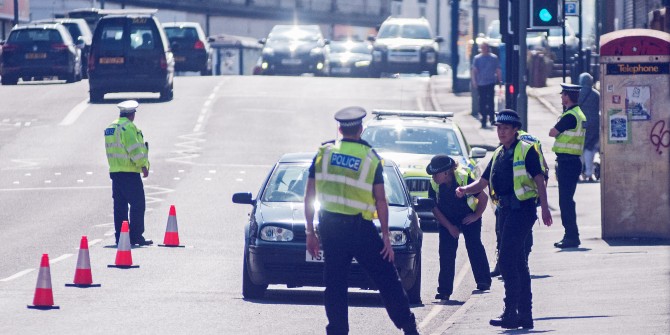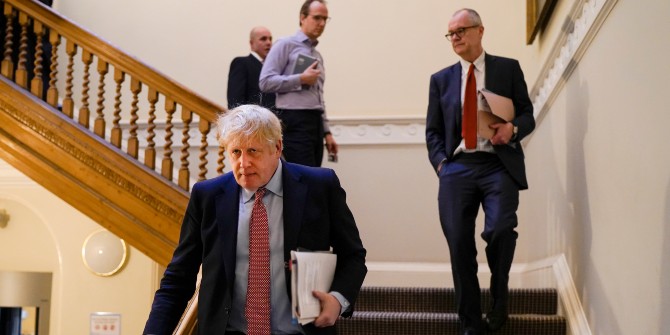Drawing on research in Scotland on the use of Fixed Penalty Notices and patterns of enforcement, Vicky Gorton, Susan McVie and Kath Murray (University of Edinburgh) consider whether in legislating so extensively, governments created the conditions for non-compliance and an attendant loss of moral authority.
All in it together?
In March 2020, the UK was plunged into lockdown and the Coronavirus Public Health Regulations introduced, placing extraordinary restrictions on our personal freedoms and civil liberties. The banning of everyday activities represented a shock to our libertarian societal values and behavioural expectations, and resulted in hardships for individuals and families that were unevenly felt.
In daily broadcasts, political leaders and prominent figures of authority reminded us that we were all in it together, subject to the same rules, guidance, and expectations of behaviour. Evoking a mix of social responsibility, unity, and Blitz spirit, Prime Minister Boris Johnson declared to the nation that “in this fight we can be in no doubt that each and every one of us is directly enlisted. Each and every one of us is now obliged to join together”.
Yet, within a relatively short period of time, a series of high-profile rule breaches by people in privileged and powerful positions began to weaken any such appeal to the greater good. In April 2020, within two weeks of the Regulations being enacted, Scotland’s Chief Medical Officer Catherine Calderwood resigned after apologising for making ‘a mistake’ in visiting her second home, contravening stay at home rules. A month later, Professor Neil Ferguson stepped down as advisor to the UK government’s SAGE committee after admitting to an ‘error of judgement’ in receiving visits from his partner when household mixing was banned. Following police investigation, no formal action was taken against Calderwood or Ferguson.
Further high profile examples of apparent rule violations followed, including Downing Street Chief of Staff Dominic Cummings who travelled from London to Durham when strict rules on travel were still in place; and Margaret Ferrier MP who travelled between Glasgow and London despite knowingly having Covid symptoms. Both strenuously denied breaking the rules but, while Cummings escaped punishment, Ferrier was charged and faces trial later this year.
The most recent, and high profile, example emerged in December 2021 with reports of a series of ‘gatherings’ at Downing Street and Whitehall, and a leaked video showing staff joking about a Christmas party. A formal investigation by Sue Gray identified numerous gatherings over a period of 20 months in circumstances that she described as ‘difficult to justify’. In March 2022, the Metropolitan Police Service began to issue fines to multiple individuals, including the Prime Minister, for breaching the regulations.
Considering the inevitable media feeding frenzy that followed the earlier cases, it seems remarkable that those in positions of such power and influence were not more scrupulous in adhering to their own rules. Most especially, as the head of government, it seems incredulous that the Prime Minister should claim that ‘it did not occur’ to him that his actions had amounted to breaking them.
Keeping up with the Regulations
The defensive narrative deployed by the Prime Minister (and others) exploited a complex regulatory framework, containing a range of exceptions. These included the ‘reasonable excuse’ provisions for leaving home during lockdown, and an exception allowing ‘gatherings’ for ‘essential work purposes’. In the case of the Downing Street parties, the decision to issue Fixed Penalty Notices appears to have been based on an interaction between the two, with differing implications for Johnson (as resident) and staff: “When I went into that garden just after six on May 20 2020, to thank groups of staff before going back into my office 25 minutes later to continue working, I believed implicitly that this was a work event.” (Boris Johnson, 12 January 2022)
Looking back to the first lockdown in March 2020, a broadly similar set out of rules was introduced across the UK, albeit arrived at via different legislative routes. From this common starting point, convoluted legislative structures quickly developed across each of the UK nations, with different rules in different places at different times. While policy announcements provided notice of some forthcoming regulatory changes, Ministers nonetheless continued to rely on emergency legislative procedures, with minimal retrospective parliamentary scrutiny, described by Tom Hickman as a process of ‘abracadabra law-making’:
“… the appearance of new criminal laws in this way is reminiscent of a rabbit being pulled from a magician’s hat, except the hat here belongs to the Minister and the magic words are not “abracadabra” but “the Secretary of State is of the opinion that, by reason of urgency, it is necessary to make the instrument without a draft having been laid before, and approved by Parliament”. With such words the requirement for the regulations to have prior approval of Parliament before being made is wafted away and the regulations can be brought into effect by executive order and published at the same time.”
As an example of the unfolding complexity, regulatory provisions introduced in Scotland to restrict the size of social gatherings, while at the same time providing more freedom for children and young people, demonstrated the difficulty in legislating for the minutiae of social life:
“The Regulations also set out that children under the age of 12 do not count towards the 6 person limit for indoor gatherings in public places, such as restaurants. However, they do count towards the 2 household limit in these settings. When gathering outdoors, children under the age of 12 do not count towards the 2 household or 6 person limit in order to allow children to benefit from outdoor play. These regulations also allow young people aged 12 to 17 to meet up in groups of up to 6 at a time outdoors without being subject to the 2 household limit. If an outdoor gathering only consists of some children under 12 and some children aged 12 to 17 then the 6 person limit will apply to the entire gathering.”
(Scottish Government policy note)
Blurring the lines
In addition to the problems caused by rapidly shifting statutory legislation, the provision of non-statutory government guidance blurred the lines between what were legally enforceable ‘rules’ and what was only ‘advice’. For example, guidance stating that outdoor exercise was limited to once a day was widely reported as a rule in England and Scotland, but the statutory restriction only applied in Wales. This fusion of law and advice ‘impl[ied], even unintentionally, that criminal law restrictions were different or more extensive than they in fact were’ (Hickman, 2020).
According to Raphael Hogarth (2020), this ambiguity created three important risks: first, that the police may act beyond their powers and interfere unlawfully with people’s liberty; second, that law-abiding people would be deterred from engaging in lawful, harmless activities; and third, that the public may lose trust and confidence in government in general, and the police in particular.
Policing the pandemic
Keeping up with the rapidly changing laws, and a lack of clarity between law and guidance, posed practical difficulties for those on the frontline
Police officers tasked with enforcing the rules were faced with a particular dilemma. The complexity and frequency of regulatory change led to good faith mistakes, facilitated behaviours on the borderline of legal acceptability without being in keeping with the spirit of the law, and also provided loopholes for those found in breach of the rules.

For the most part, police forces across the UK adopted a discretionary approach based on engagement and encouragement, with enforcement reserved only for flagrant and/or persistent breaches. However, keeping up with the rapidly changing laws, and a lack of clarity between law and guidance, posed practical difficulties for those on the frontline, as illustrated by interviews we conducted with officers in Scotland:
“We didn’t know whether we were coming or going, and I’ll be upfront with you, my staff were coming to me for guidance and I was struggling…”
“The rules changed so much and varied from place to place, region to region… we struggled to know week to week, ‘Right, how many people are actually allowed in the house?”
“They would change on a day to day basis, the rules and regulations, it was struggle for us even to keep up with the law, and what was guidance, what was law, with what we could enforce and what we couldn’t.”
“People would say ‘well I didn’t know, I can’t keep up with these changes’ and stuff like that … people could then play on the constant changes to talk their way out of it.”
So what do we know about those who were found to have broken the rules?
The usual and the unusual suspects
UK-wide surveys carried out during the pandemic found compliance with the Regulations was high. Nevertheless, tens of thousands of Fixed Penalty Notices were issued by the police across England and Wales, Scotland and Northern Ireland. During the first lockdown, research in Scotland found the vast majority of those subject to enforcement for breaching COVID regulations had a history of police contact, lived in deprived communities, and were typical of those that might be expected to break the rules (McVie 2021; HMICS 2020). As one officer we interviewed described them, “a group of people that obviously exist who don’t abide by normal society rules. To them it makes no difference.”
As the pandemic wore on, however, the regulation of everyday activities brought a new swathe of people to the attention of the police, particularly in relation to illegal gatherings: the middle classes, students, retired professionals, and those living in affluent areas. Resonant of the Downing Street parties, officers found themselves called to incidents involving those “who should have known better” and to “very expensive houses, very nice areas that normally you would only be there because there’s been a crime against the householder.”
No UK-wide data exists about the personal circumstances of those who received FPNs for breaching the Regulations; however, postcode analysis of fine recipients in Scotland shows a dramatic shift in the social gradient of those subject to enforcement. Overall, the majority of fines were issued to people living in areas of high deprivation. However, Figure 1 shows that the proportion of fines issued to those living in the most deprived communities reduced substantially over time, while the proportion issued to those living in more affluent areas increased. Indeed, the disparity in likelihood of receiving a fine between those in the 10% most deprived communities and 10% most affluent communities reduced from 12.6 during the first UK-wide lockdown period (March to June 2020) to 1.8 in the second (January to May 2021). This distinct flattening out of the social distribution of fines is remarkable, and highlights the widening spread of non-compliance from the ‘usual’ to the ‘unusual’ suspects.
Figure 1: Percentage of COVID-related Fixed Penalty Notices issued to people living in Scottish postcode areas classified by the Scottish Index of Multiple Deprivation

Non-compliance and regulatory legitimacy
In the context of confusing and constantly changing legislation, loopholes and exceptions, and blurred boundaries between law and guidance, it is perhaps unsurprising that the normative behaviours of the population changed during lockdown. That elected officials and public servants failed to adhere to the rules is a different matter, not least by dint of the higher standards expected of those in public life. Nonetheless, the waning of compliance across the social spectrum raises fundamental questions about the legitimacy of the Coronavirus Regulations.
It is a well-established principle that laws should be clear, stable and fair; otherwise, they risk undermining the consent of the public to abide by them and the ability of the police to enforce them. Yet the speed at which rules were introduced left little or no room for the normal processes of scrutiny or debate that ensure regulatory fairness and transparency.
If the UK ever faces another situation requiring such stringent and intrusive legal restrictions, it is imperative to learn lessons from this one
The sheer breadth of the rules meant most breaches took place in settings where compliance relied on self-policing and a moral imperative to ‘do the right thing’. This appeal to social contract principles helps explain both the surprise expressed by police officers at the behaviour of those who ‘should have known better’, as well as the public anger at the Downing Street parties and other high-profile breaches. The failure of leadership in this respect, whereby elected officials and public servants failed to voluntarily adhere to the same strict standards of behaviour that they had imposed upon the population, is brought into even sharper focus by the stringent rules imposed in other settings — particularly in health care, whereby adherence was secured by mandatory arrangements that saw people dying in hospitals and care homes without the ability to have family members and loved ones at their side.
A question of balance?
It is no surprise that the apparent efforts of those in the highest positions of government to exploit legal loopholes for political expediency have fuelled public anger and severely dented the moral authority of those entrusted with making the rules. However, the general waning of public compliance raises important issues about poor regulation on the one hand and over-regulation on the other. There is no doubt that policy makers, working to exceptional time pressures, faced a difficult job in trying to balance the actions needed to protect public health and save lives against public tolerance for strict statutory constraints on freedoms in a liberal democratic society. The question is whether they got the balance right.
In the event that the UK ever faces another situation requiring such stringent and intrusive legal restrictions, it is imperative to learn lessons from this one. If laws aimed at regulating everyday life are too complex to be laid out clearly, appear open to varying interpretation, and are subject to rapid and unscrutinised change, it is questionable whether expansive (and, often, unenforceable) legislation is the best vehicle with which to encourage public cooperation.
This post represents the views of the authors and not those of the COVID-19 blog, nor LSE. It is based on a wider body of work being developed under the Policing the Pandemic in Scotland study, funded by the Economic and Social Research Council (ESRC) as part of UK Research and Innovation’s rapid response to COVID-19.





